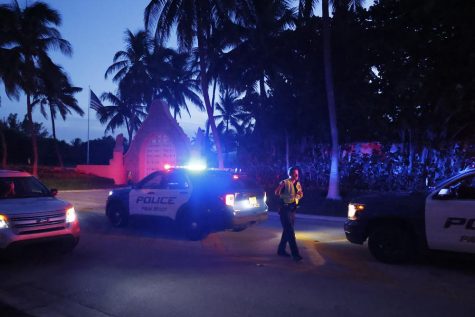Mar-a-Lago raid prompts looming repercussions for Trump
November 1, 2022

The FBI raided former President Donald Trump’s home “Mar-a-Lago” in Palm Springs, Fla. on Aug. 8, finding 184 classified documents. The investigation into the possible indictment of Trump is still underway.
At the time of the raid, Trump was not at Mar-a-Lago, and according to his attorney, the raid was unannounced. The FBI gained access to the property through contact with US Secret Service prior to the raid. The inventory found included four dozen folders that were marked classified, but found empty. Forty two empty folders were labeled to be returned to staff secretary or a military aide.
Many of the documents uncovered at the residence are so highly classified that only a select few individuals are authorized to view them, as they detail the nuclear abilities of an undisclosed foreign government.
The impending consequences that this discovery will bring for Trump are still undetermined. However, on Sep. 20 a meeting took place between Trump’s legal department, the Department of Justice, and the special master for the case Judge Raymond Dearie. The question currently being investigated is whether or not the documents found in Trump’s possession are protected by executive privilege. Dearie is taking on the task of reviewing all 11,000 total documents found by a deadline of Nov. 30.
Trump’s legal team was unable to provide evidence to reinforce his claim that the documents he extracted had been declassified.
“As far as I’m concerned, that’s the end of it,” Dearie said in response to Trump’s legal team at the first court hearing for the case.
Whether or not the documents were declassified, what was in the 42 empty folders is still unknown. One of the chief purposes of the investigation is to identify a pattern within the contents of the other classified documents, which could possibly provide an explanation as to what the documents originally in the empty folders were about. Still, Trump cited both the investigation and the raid as an invasion of his privacy.
On his website, Truth Social, Trump wrote: “They could have had it anytime they wanted—and that includes LONG ago. ALL THEY HAD TO DO WAS ASK.”
However, the raid was not completely unprompted. An email from the National Archives was sent to Trump’s lawyer on April 12, warning them of an imminent examination of the sensitive documents by the FBI. Furthermore, Trump and his legal team had been cooperating and working with the FBI throughout the spring. Trump’s attorneys told the FBI that they had thoroughly searched the property themselves, and handed in one folder containing classified documents. However, the FBI learned from an unidentified source that what they received from the attorneys was just a small part of what was being stored there, hence the raid.
With Trump’s supposed plans to run again in the 2024 election, some, including Trump himself, believe the situation can be used to his advantage. The scandal puts him in the center of conflict and offers him an opportunity to be the victim of an institution trying to dismantle his reputation.
“The Department of Justice has reached an intolerable state of weaponized politicization,” House Minority Leader Kevin McCarthy (R) said in a statement on Twitter.
In contrast, most view this as a pitfall, perceiving his withholding of classified information as inappropriate.
“It’s also unprecedented for a former president to take all this classified information and put it into a country club,” Trump’s former attorney William Barr said in an interview with Fox News.
While not directly affected by the situation, many students have done their own investigation into the abnormal situation, forming opinions of their own.
“The fact that Donald Trump held classified documents in his private Florida house for months even after repeated requests from the National Archives shows questionable levels of honesty from the former president,” Maddie Foley (’25) said.


